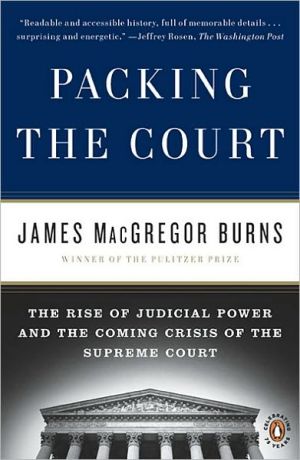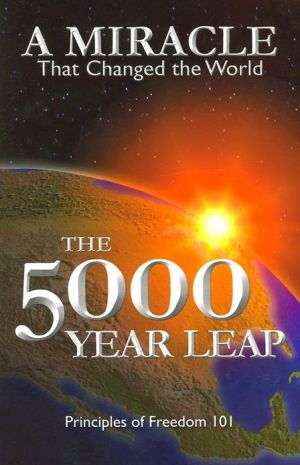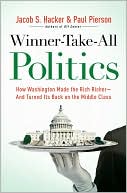Packing the Court: The Rise of Judicial Power and the Coming Crisis of the Supreme Court
"MacGregor Burns has been recognized as one of the great masters of the study of power and leadership in America. Here he turns his eye to an institution of government that he believes has become more powerful, and more partisan, than the founding fathers envisioned - the Supreme Court." "Remarkable as it might seem today, the framers did not intend the Supreme Court to be the ultimate arbiter in all constitutional issues, and instead foresaw a more limited role for the highest court ill the...
Search in google:
From renowned political theorist and Pulitzer Prize winner James MacGregor Burns comes an illuminating critique of how an unstable, unaccountable, and frequently partisan Supreme Court has come to wield more power than the Founding Fathers ever intended. The New York Times - Michiko Kakutani Some of Mr. Burns s proposals are bound to be controversial: for instance, he suggests near the end of the book that a president could challenge judicial authority by announcing "flatly that he or she would not accept the Supreme Court s verdicts because the power of judicial emasculation of legislation was not - and never had been - in the Constitution." Happily for the reader, the bulk of this volume is less didactic, charting the fallout that "the passions of the day," in Justice Felix Frankfurter s words, have had on its rulings, while analyzing the role that chance, timing and the mysteries of human personality have played in shaping the institution and its decisions.
\ Michiko KakutaniSome of Mr. Burns’s proposals are bound to be controversial: for instance, he suggests near the end of the book that a president could challenge judicial authority by announcing "flatly that he or she would not accept the Supreme Court’s verdicts because the power of judicial emasculation of legislation was not - and never had been - in the Constitution." Happily for the reader, the bulk of this volume is less didactic, charting the fallout that "the passions of the day," in Justice Felix Frankfurter’s words, have had on its rulings, while analyzing the role that chance, timing and the mysteries of human personality have played in shaping the institution and its decisions. \ —The New York Times\ \ \ \ \ Publishers WeeklyPulitzer Prize–winning author Burns's latest is a jeremiad against the influence and unelected power of the Supreme Court. Burns ably guides reader through a brief history of the court, concentrating on its instances of overreaching the bounds of its authority, condemning the unconstitutionality of judicial review and closing with a series of suggestions for reform that include more rigorous presidential oversight of Supreme Court rulings. Norman Dietz is as polished and assured as ever; he reads ably and clearly, eliding Burns's exasperation and laying out the facts with a minimum of inflection and understated authority. A Penguin Press hardcover (Reviews, Apr. 27). (Aug.)\ \ \ Kirkus ReviewsA Pulitzer Prize-winning historian claims that John Marshall got it spectacularly wrong: "It is emphatically the province and duty of the American people, not of the nine justices of the United States Supreme Court, to say what the Constitution is."The Supreme Court's power and authority date from 1803's Marbury v. Madison, which established it as the final arbiter of any conflict between the law and the Constitution. Burns (Leadership Scholar/Univ. of Maryland; Running Alone: Presidential Leadership from JFK to Bush II-Why It Has Failed and How We Can Fix It, 2006, etc.) departs from conventional wisdom and argues that Marbury's enshrinement of the judiciary's supremacy was actually an extra-Constitutional power grab by Chief Justice Marshall. Marbury immunized the court from checks and balances, made it unaccountable within our democracy and ensured deliberate efforts by the party in power to "pack" the court with its own partisans. In graceful prose, Burns takes us on a quick historical tour of many famous and infamous decisions, demonstrating how the court, frequently imagined as the protector of the weak and powerless, has more often been the friend of the powerful and a "a choke point for progressive reforms," contemptuous of popular legislation. He comments on previous, unavailing efforts to curb the Court's power-drives for impeachment, tinkering with the court's numbers, popular votes on recall of decisions or of the Justices themselves, or fiddling with the rules, such as requiring a supermajority to strike down federal legislation. Astonishingly, Burns then proposes that President Obama, in an act of transformational leadership, announce his refusal to accept Supreme Courtverdicts overruling vital legislation because the Constitution does not mention this power. Supporters of judicial supremacy, writes the author, should then be invited to amend the Constitution to explicitly provide for a power the court has never truly possessed. The author concedes the risk of this "open defiance of constitutional customs and the myths and mysteries that have long enshrouded the court . . . There might even be demands for impeachment." No kidding. Tendentious history in service of a reform bound to go nowhere. Author events in New York and Washington, D.C.\ \ \ \ \ From the Publisher"[Dietz's] tone and pacing make it easy to follow the constitutional arguments, and he pauses at crucial intervals to allow listeners to consider Burns's ideas." —-AudioFile\ \








